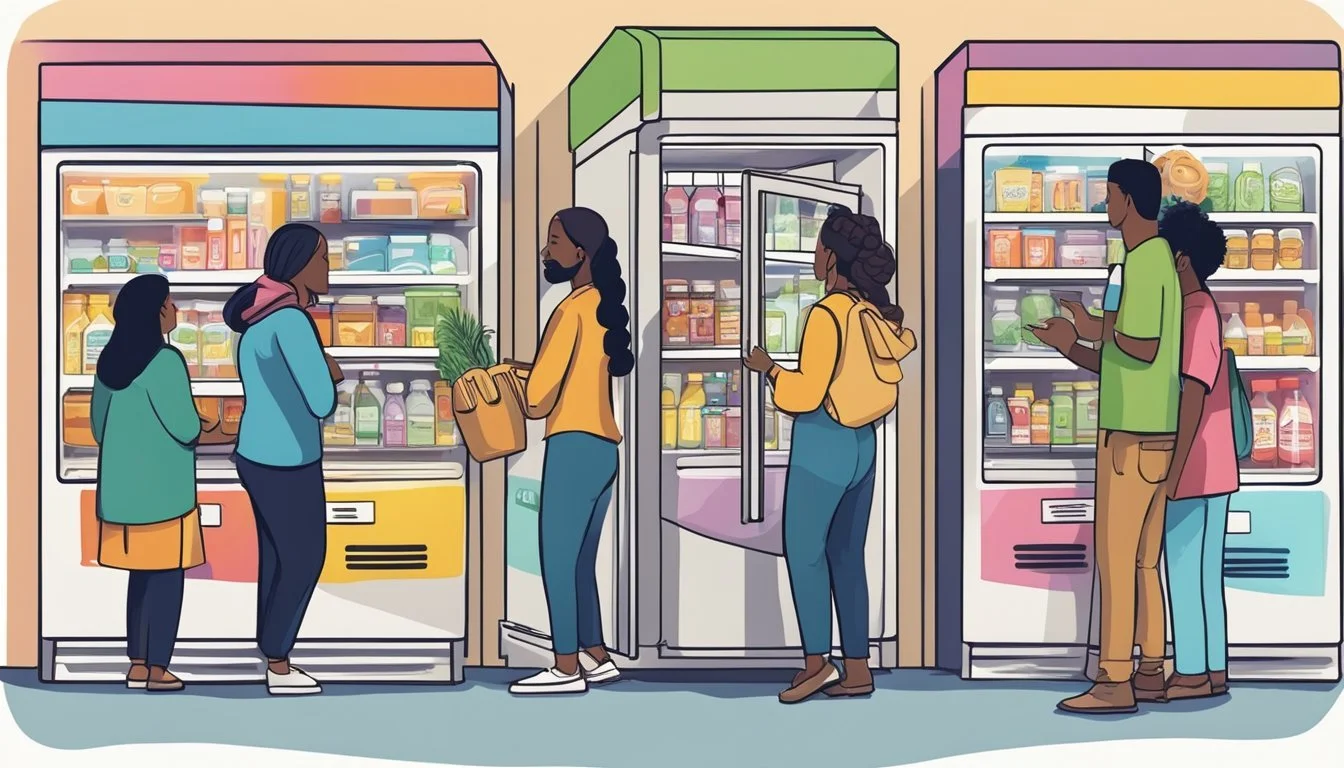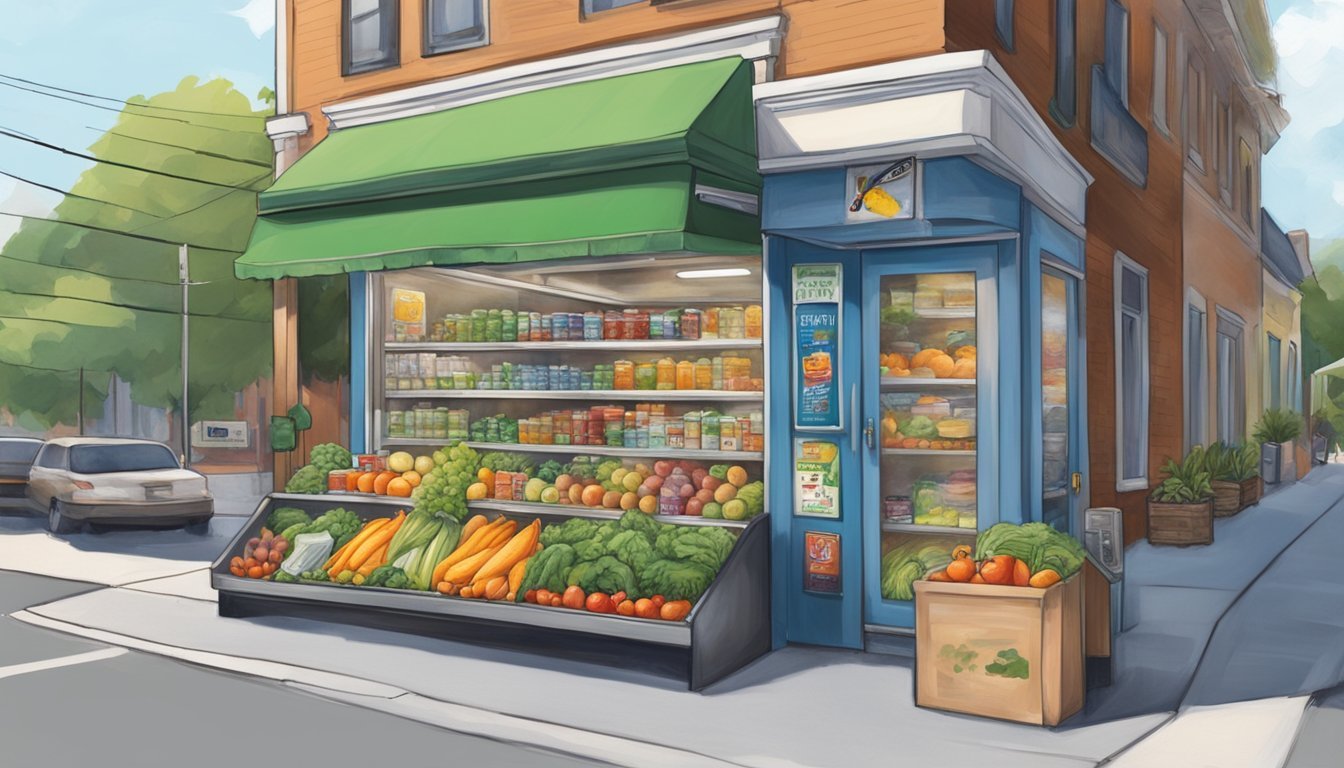Gainesville, FL Community Fridge
Addressing Food Insecurity Locally
In Gainesville, Florida, a movement is underway to address food waste and insecurity through an innovative community-led solution known as the community fridge. This initiative allows residents and businesses to share surplus food, providing those in need with access to fresh and nutritious meals. Located within the heart of the city, the Gainesville Community Fridge is more than just a place to store food; it is a symbol of communal support and solidarity.
Local organizations and individuals collaborate to maintain the community fridge, emphasizing the critical role of community effort in its success. Businesses, including local eateries and markets, contribute by donating food that would otherwise be discarded due to nearing expiration dates or excess stock. The fridge operates on a take-what-you-need, leave-what-you-can basis, thereby fostering an environment of mutual respect and resource sharing. Through this initiative, Gainesville sets an example of how small-scale, community-driven interventions can make a significant impact on local food systems.
The community fridge in Gainesville serves as a hub where the local food community converges to combat hunger and reduce waste. It stands as a testament to the city's dedication to creating economic opportunity and encouraging educational outreach in matters of food sustainability. By ensuring that usable food reaches those who need it most, Gainesville strengthens its community ties and reflects a shared commitment to a more equitable and environmentally conscious future.
Concept and Origin of Community Fridges
Community fridges are a grassroots solution to local hunger and food waste, first appearing as solidarity or honesty fridges in regions like Spain and Germany, and later gaining traction internationally, including in the U.S.
Community Fridge Beginnings
The concept of the community fridge began as an innovative way to address food insecurity and food waste simultaneously. Originating from the "solidarity fridge" concept in Spain and "honesty fridges" in Germany, they serve as communal places where individuals can leave and take food free of charge. These fridges operate on the basis of trust and communal responsibility.
International Growth
The idea quickly spread, with the U.K. and Ireland establishing their own networks of community fridges. In the United States, the concept received a significant boost during the COVID-19 pandemic, leading to the creation of initiatives like the Community Fridge Network, furthering the presence of community fridges across various states. As public awareness and support grew, so did the number of these fridges, representing a global movement of mutual aid and environmental consciousness.
Community Fridges in Gainesville, FL
Community fridges in Gainesville provide a means to share good food that would otherwise go to waste, directly aiding those in need within the local community. They embody a grassroots movement that promotes food accessibility in easily reachable public spaces.
Local Initiatives
In Gainesville, community fridges have been established as local initiatives aimed at addressing food insecurity. They operate on the simple principle that anyone can take what they need and leave what they can. For example, the Gainesville Community Fridge project, facilitated by changex.org, encourages residents of Alachua County to join in on this collective effort. These fridges are often situated in community-oriented spots where visibility and access are ensured.
Honor System and Accessibility
Community fridges in Gainesville adhere to an honor system, trusting individuals to fairly take and contribute food. They are intentionally placed in accessible public spaces, fostering an inclusive environment. The accessibility aspect is crucial, as it ensures that no one is barred from using the fridge based on location or physical ability. By making these fridges available to everyone, Gainesville supports a culture of sharing and mutual assistance.
Health and Safety Regulations
The operation of community fridges within Gainesville is subject to local laws. These include health and safety regulations ensuring that the food provided is safe to consume. Regular inspections and maintenance are part of the norm, with guidelines in place to handle perishable and non-perishable items correctly. Electricity costs, which average around $150 annually in cities like Atlanta, are also considered for the proper functioning of these fridges. The upkeep of these community assets, therefore, requires a collective commitment to health, safety, and financial sustainability.
Addressing Food Insecurity
In Gainesville, FL, community efforts are in place to address food insecurity by deploying methods that not only offer nutritious food to those in need but also reduce food waste through innovative strategies.
Reducing Food Waste
Community programs in Gainesville have identified surplus food as a resource that can be repurposed to address food scarcity. Volunteers collaborate with restaurants, grocery stores, and other food suppliers to collect unsold, yet still consumable, food items. This surplus food is then distributed to local food fridges, ensuring it reaches residents before spoilage, thus effectively reducing food waste.
Restaurants: Partner to provide unsold prepared meals.
Grocery stores: Contribute perishable items close to the sell-by date.
Local farms: Donate excess produce not sold in markets.
This systematic redirection of food helps maintain a steady supply of edible food items that would otherwise be discarded.
Nutrition Accessibility
Access to nutritious food is a vital component of combating food insecurity in Gainesville. Community fridges serve as a central node in this endeavor. These fridges are regularly stocked with fresh produce and nourishing pre-packaged meals. Anyone in need can access these resources without any barriers, promoting a dignified way to address nutritional gaps.
Fresh Produce: Includes fruits and vegetables, key for a balanced diet.
Pre-packaged Meals: Often include a variety of food groups, ensuring broad nutritional intake.
Community fridges not only provide immediate access to food but also imbue the local population with the ability to choose healthy options, supporting consistent nutritional health among residents.
Involvement and Support
The Gainesville Community Fridge initiative thrives through active involvement with local businesses and the provision of community employment opportunities. It harnesses robust local support to offer services that address food insecurity.
Collaboration with Local Businesses
Local businesses are pivotal to the success of Gainesville's Community Fridge. Through donations and partnerships, businesses provide essential resources that keep the fridge stocked with fresh and nutritious food. Participating businesses contribute in various ways:
Food Donations: Restaurants, cafes, and grocery stores often donate surplus perishable items.
Logistical Support: Storage space and transportation services are sometimes offered by local enterprises.
Sponsorships: Monetary or in-kind sponsorships help to sustain operations.
Community Employment Opportunities
The Gainesville Community Fridge not only supports the community with access to free food but also creates employment opportunities. By involving community members, it promotes a sense of ownership and empowerment:
Fridge Management: Employing individuals to maintain and monitor the fridge ensures it remains a reliable resource.
Outreach Services: Hire personnel to coordinate with local businesses and manage donations, fostering a cycle of ongoing support.
Maintenance of Community Fridges
Proper maintenance is crucial for the longevity and effectiveness of community fridges in Gainesville, FL. It ensures that appliances like refrigerators remain in good working condition and that the service they provide to the community is uninterrupted.
Repairs and Service Providers
Gainesville's community fridge organizers often collaborate with local appliance repair services to address any technical issues that arise. Martin's Appliance Repair and Burton's Appliance Repair are reliable service providers for repairing essential appliances such as refrigerators, washers, and dryers. They offer qualified technicians equipped to handle a spectrum of repairs. The collaboration with these providers facilitates prompt servicing that minimizes downtime and maintains food safety.
Preventative Maintenance: Regular checks by repair services to anticipate issues before they worsen.
Reactive Repairs: Efficient response to fix unexpected breakdowns.
Appliance Service Provider Contact Information Refrigerator Martin's Appliance Repair (Contact Details) Washer & Dryer Burton's Appliance Repair (Contact Details)
Volunteer Contributions
Volunteers play a significant role in the upkeep of Gainesville's community fridges. They are entrusted with the responsibility of not just filling the fridge but also ensuring that it stays clean and functional. Volunteers may create a cleaning schedule to maintain hygiene and keep the fridge inviting for community members.
Daily Tasks: Inspecting the appliances for any immediate issues or potential hazards.
Weekly Duties: Organizing food items and performing a thorough cleaning.
Volunteers' efforts in maintaining the fridges are invaluable, as they enable these appliances to serve the community effectively and without interruption.
How to Participate
Participation in the Gainesville Community Fridge initiative is encouraged for those interested in contributing to the local food-sharing movement. Engaging with the program can be done through various means including getting in touch with coordinators and actively being part of their social media conversations.
Contact Information
Individuals looking to participate in the Gainesville Community Fridge project can reach out directly to the program's organizers. The primary method to establish contact is by sending an email to the official Contact Us address provided on the changex.org platform. This will open a line of communication for prospective volunteers or donors to inquire about how they can contribute.
Email: Direct contact is recommended for a thorough review of how one can get involved, whether through food donation or volunteering.
Social Media Engagement
Social media platforms offer an alternative channel for those looking to engage with the Gainesville Community Fridge. Being active on Facebook and Twitter allows participants to:
Stay updated on the fridge's needs and events
Engage with the community by spreading the word, sharing posts, and participating in discussions
Facebook Page: Interaction here includes liking, commenting, and sharing posts to raise awareness within the Gainesville area.
Twitter Handle: Posting experiences, retweeting calls for support, and following their feed promotes ongoing dialogue about food accessibility.
Being an active participant in these social media outlets not only supports the project's visibility but also facilitates a supportive network for those in need within the community.
Resources and Guides
The success of the Gainesville, FL Community Fridge initiative hinges on the effective distribution of resources and adherence to structured guides. These resources empower local residents to either contribute to an existing fridge or establish a new one, while the guides ensure the community fridges are utilized properly and sustainably.
Establishing a New Community Fridge
For individuals or organizations interested in setting up a community fridge in Gainesville, resources are readily accessible. Key steps involve gaining support from the community and local government, understanding food safety regulations, and establishing a maintenance plan. The process begins with a proposal to local authorities to secure necessary permissions and ensure alignment with city guidelines. Initiators must then engage with the community to foster a network of volunteers and donors who will sustain the fridge.
A 5 Step Guide is available to streamline this process:
Community Consultation: Reach out to local residents and businesses for support.
Approval and Permits: Obtain the necessary clearances from government bodies.
Location and Set-Up: Determine a suitable, accessible place for the fridge.
Maintenance Plan: Develop a schedule for regular cleaning and stocking.
Launch: Officially open the fridge to the public with clear usage instructions.
5 Step Guide for Proper Usage
To ensure Gainesville community fridges remain a sustainable resource, a concise guide has been developed outlining best practices for users. This guide helps to maintain food safety, reduce waste, and respect the shared nature of these resources.
The 5 Step Guide for proper usage includes:
Check Dates: Always verify expiration dates before consuming items.
Take Sensibly: Only take what you need, leaving enough for others.
Keep It Clean: Maintain cleanliness to ensure a safe environment for all.
Donate Appropriately: Offer unopened, non-perishable, and fresh items.
Spread the Word: Encourage others to participate and contribute to the fridge's success.
By following these guidelines, Gainesville's community fridges can continue to provide for those in need while fostering a spirit of communal support and waste reduction.
Multilingual Accessibility
The Gainesville Community Fridge initiative recognizes the diversity of its beneficiaries and addresses the language barriers that could impede access to food resources. Information pertaining to the Community Fridge is available in several key languages to encompass a broad demographic, ensuring no one is left behind due to a language obstacle.
Key Languages Provided:
English: Primary communication language
Español (Spanish): Widely spoken, providing ease of access for the Hispanic community
Português (Portuguese): Accommodates the Brazilian and Portuguese-speaking residents
中文 (Chinese): Simplified and Traditional script options cater to the Chinese community
عربي (Arabic): Addressing the needs of Arabic speakers
Tiếng Việt (Vietnamese): Support for a growing Vietnamese population
한국어 (Korean): Inclusion of Korean language materials
Français (French): Catering to French-speaking individuals
Kreyòl Ayisyen (Haitian Creole): Reaching out to the Haitian Creole-speaking community
日本 (Japanese): Information available for Japanese residents
The multilingual approach of the Gainesville Community Fridge goes beyond just the provision of food; it involves creating an inclusive environment where people from various linguistic backgrounds can also contribute and volunteer. This multi-language support is evidenced through:
Signage: Clear, multilingual signs direct visitors to the fridge and explain its use.
Informational Pamphlets: Handouts in multiple languages describe how to donate food and how to take food from the fridge.
Online Presence: A user-friendly website and social media channels that provide updates, volunteer information, and educational resources in all listed languages.
Through these efforts, the Gainesville Community Fridge ensures that language differences do not hinder community members’ access to food assistance.
Conclusion
The Gainesville Community Fridge, located in Alachua County, Florida, represents a significant initiative toward addressing food insecurity and reducing waste. It operates on the principle of community sharing and support, providing access to free food for those in need. The concept, often referred to as a "freedge," is driven by local participation -- community members are encouraged to contribute and take food as needed.
The success of such a fridge can be largely attributed to the simple, yet powerful idea that access to food should be a right, not a privilege. The fridge is restocked voluntarily by the public and is available without restriction, thereby fostering a spirit of communal responsibility and generosity.
Despite the potential logistical challenges, the Gainesville Community Fridge demonstrates a proactive approach toward sustainability and community care. By encouraging the redistribution of food that might otherwise go to waste, they not only combat hunger but also contribute to environmental conservation.
Their impact might extend beyond the practicalities of offering food, as they provide a platform for community building and engagement. Through such initiatives, Gainesville takes meaningful strides toward empowering its residents and nurturing a culture of mutual aid and respect. This model could potentially inspire other communities to implement similar programs, amplifying the positive outcomes on both a local and global scale.











